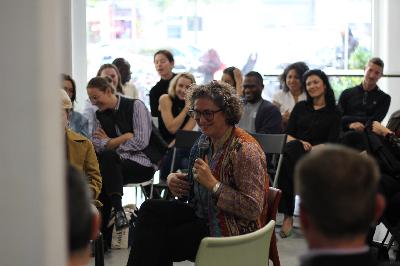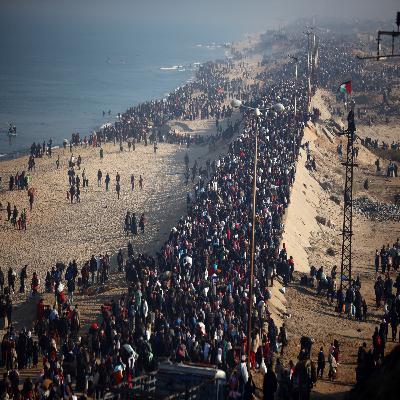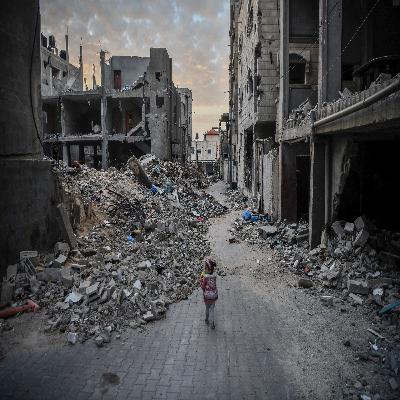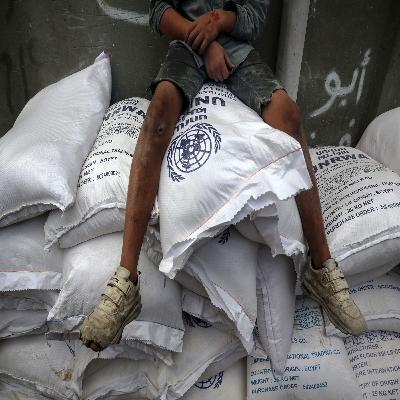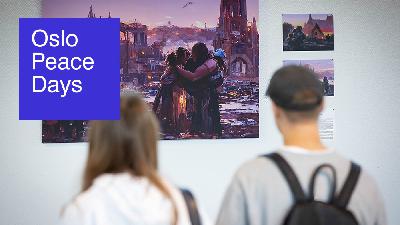Discover PRIO Events
PRIO Events

PRIO Events
Author: Peace Research Institute Oslo (PRIO)
Subscribed: 5Played: 26Subscribe
Share
© Peace Research Institute Oslo (PRIO)
Description
Listen to dozens of seminars hosted by the Peace Research Institute Oslo (PRIO).
Hosted on Acast. See acast.com/privacy for more information.
70 Episodes
Reverse
As the global balance of power shifts, Southeast Asia finds itself at the crossroads of economic transformation, technological advancement, and strategic realignments. One key element in this evolving landscape is China’s Digital Silk Road (DSR), a crucial component of the Belt and Road Initiative (BRI) aimed at positioning China as the global technological superpower. This initiative promises to reshape the global digital order and could trigger a technological and normative rift with far-reaching geopolitical consequences.In this episode, recorded live at PRIO, a panel of regional experts and researchers unpack the findings of a three-year project examining China’s digital technology exports to Malaysia, Indonesia, and the Philippines. How are these countries managing the promises and perils of digital infrastructure tied to Beijing’s ambitions? And what does it mean for sovereignty, governance, and global power?From infrastructure and internet governance to normative influence and political risk, the conversation offers a comparative look at how Southeast Asia is responding to China’s rising digital influence.Speakers:Dr. Ilaria Carrozza, PRIODr. Cheng-Chwee Kuik, Universiti Kebangsaan MalaysiaJulio Amador III, Ateneo de Manila UniversityHabib Abiyan Dzakwan, CSIS IndonesiaChair: Nic Marsh, PRIO🎙️ Tune in for a sharp, regionally grounded discussion on China’s Digital Silk Road and the digital futures of Southeast Asia. Hosted on Acast. See acast.com/privacy for more information.
There has been a steep increase in the reliance on AI tools for warfighting. This is unsurprising as AI allows for increased speed on the battlefield, better surveillance, tracking, target identification and validation, as well as more data-driven decision support both for identifying capabilities and for target selection. The increased reliance on AI has fueled a push for more weapons’ autonomy on the battlefield.These changes to the way wars are fought have led to a range of ethical concerns around the use of AI for life-or-death decisions on the battlefield. In this episode, recorded live at PRIO, a panel of experts explores the implications of AI-driven warfare. What does it mean to delegate life-or-death decisions to algorithms? How should states and societies respond to this accelerating trend?Panelists:Eivind Vad Petersson, State Secretary, Norwegian Ministry of Foreign AffairsJovana Davidovic, Senior Researcher, PRIOMitt Regan, Professor of Law, Georgetown UniversityModerator: Greg Reichberg, PRIO🎙️ Tune in for a thought-provoking discussion on the intersection of AI, ethics, and modern conflict - and what’s at stake as the line between human and machine decision-making continues to blur. Hosted on Acast. See acast.com/privacy for more information.
2025 marks a turning point for the global aid sector. While many donors are pulling back, Norway is charting a different course - reaffirming its commitment to flexible, principled funding and the strategic use of aid as soft power.In this episode, recorded live at PRIO, a panel of leading scholars and practitioners explore how the current crisis in global aid might serve as an opportunity for transformation. Are we witnessing a reformist recalibration or a call to radically rethink the entire system?From debates around localization and institutional memory to the role of evidence-based approaches and equitable participation, the conversation tackles the big questions shaping the future of aid.Speakers:Erik Abild, NORADØyvind Eggen, ArtikulertGry Ballestad, Norwegian People’s AidOle Jacob Sending, NUPI & Centre for GeopoliticsSimon Reid-Henry, PRIOKristin Bergtora Sandvik, University of Oslo and PRIOChair: Maria Gabrielsen Jumbert, PRIO🎙️ Listen now for an unflinching discussion on the ideas, tensions, and actors shaping the future of global aid - and Norway’s place within it. Hosted on Acast. See acast.com/privacy for more information.
Listen to this inspiring seminar with Professor Halleh Ghorashi, a leading scholar in diversity and inclusion at Vrije Universiteit Amsterdam (VU). She shared how her understanding of engaged scholarship has evolved throughout her academic journey, highlighting its impact on academia, society, and refugee communities.Drawing from her work with the 'research within expertise' lab: Refugee Academy at VU, Professor Ghorashi showcased how engaged scholarship can drive meaningful change. Critical theory and feminist epistemology have been central for her in approaching engaged scholarship from a transformative angle.In conversation with PRIO Researcher Cindy Horst, Professor Ghorashi explored her work of co-generating societal change towards increased diversity and inclusion in the Netherlands. Her transformative engaged scholarship conceptually draws on epistemic justice and builds on methods of co-creating various forms of knowledge with communities.SpeakersHalleh Ghorashi is Professor of Diversity at VU. She proposes a critical approach of diversity and inclusion and shows the importance of the perspectives of migrants and refugees through narrative methodology in creating more inclusive structures.Cindy Horst is a Research Professor in Migration and Refugee Studies and co-director of the PRIO Centre on Culture, Conflict, and Co-existence. She is the author of Creative Resistance. The social justice practices of Monarch, Halleh and Diana (Lived Places Publishing, 2023), which includes a chapter about Halleh Ghorashi.The event is co-organized by the PRIO Migration Centre and PRIO Centre on Culture, Conflict and Coexistence. Hosted on Acast. See acast.com/privacy for more information.
PRIO was pleased to invite to a seminar with Francesca Albanese, the UN Special Rapporteur on the Occupied Palestinian Territories. In this seminar, Albanese shared her firsthand experiences and insights from her work, focusing on the significant legal and political challenges facing the UN in Palestine.The seminar addressed several key issues, including the challenges surrounding the UN’s access to the occupied Palestinian territories, the humanitarian implications of the ban on UNRWA, and the ongoing cases before the International Court of Justice (ICJ) related to genocide and humanitarian aid access. Albanese also provided an update on the situation in Gaza and the West Bank, and reflected on the potential of removing Israel’s seat at the UN in response to violations of international human rights law.The conversation was moderated by Jørgen Jensehaugen, Senior Researcher at PRIO.This event was a collaboration between the Peace Research Institute Oslo (PRIO) and Palestinakomiteen Norge. Hosted on Acast. See acast.com/privacy for more information.
Once the war in Gaza ends, the narrow strip of land will require a massive reconstruction effort of unimaginable proportions. Large questions remain, such as who will pay? What political conditions can the reconstruction happen under?To help us understand some of these questions, with reflections from the Arab Gulf, PRIO hosted Ghassan Elkahlout, Palestinian scholar and Director of the Center for Conflict and Humanitarian Studies (CHS) in Doha.Tor Wennesland, PRIO Practitioner in Residence.Jørgen Jensehaugen, Senior Researcher, PRIO. Hosted on Acast. See acast.com/privacy for more information.
As war and humanitarian crises unfold in Gaza, Syria and Lebanon, a new Middle East is emerging. How can local humanitarian actors rise to the challenge? What role do they play in addressing urgent needs, fostering long-term solutions and promoting reconciliation amidst turmoil? And how can they navigate the complexities introduced by the recent UNRWA ban?SpeakersKaram Abi Yazbeck, Regional Coordinator for Caritas Middle East and North Africa, sharing first-hand testimony directly from the groundJørgen Jensehaugen, Senior Researcher at the Peace Research Institute Oslo, providing a snapshot of the region's shifting geopolitical landscape and the implications of the UNRWA banRaymond Johansen, Secretary General of Norwegian People's AidArne Næss-Holm, Director of International Programmes, Norwegian Church AidIngrid Rosendorf Joys, Secretary General, Caritas NorwayThe discussion was moderated by Cindy Horst, Research Professor, Peace Research Institute Oslo (PRIO).This event was a collaboration between the Peace Research Institute Oslo (PRIO), Caritas Norway, Norwegian People's Aid and Norwegian Church Aid. Hosted on Acast. See acast.com/privacy for more information.
In light of the shifting geopolitical landscape, the long-standing theory of democratic peace - asserting that democracies rarely wage war against each other - is facing critical scrutiny.This panel will discuss whether this principle still holds true in an era marked by shifting power dynamics, rising authoritarianism, and the erosion of liberal democratic norms.With conflicts increasingly shaped by hybrid warfare, economic rivalries, and regional instability, the traditional correlation between democracy and peace may be weakening.This discussion will explore whether contemporary democracies are more prone to conflict, or if the theory needs to be redefined for a multipolar world. The panel will also revisit Francis Fukuyama's "End of History" argument, which predicted the triumph of liberal democracy as the final form of human governance.As new global players and political ideologies emerge, panelists will assess whether this notion is still relevant, or if we are witnessing the rise of new patterns of conflict that challenge the foundations of democratic peace.SpeakersMs. Hilde F. Johnson, European Institute of PeaceProf. Carl Henrik Knutsen, University of OsloDr. Marianne Dahl, Peace Research Institute OsloThe discussion will be moderated by Dan Banik, Academic Director of Circle U's democracy hub.This event is part of Oslo Peace Days 2024. Follow this link for full programme. Hosted on Acast. See acast.com/privacy for more information.
AI shapes war, humanitarian emergencies and the roads to peace. Ongoing conflicts are also experimental laboratories, creating a boom in AI weapons systems.Before and during the Gaza war, AI-generated imagery and text has contributed to diametrically opposed versions of a ‘truth’ about violence, the plight of civilians and the intentions of humanitarian actors. While responding to hurricanes Helene and Milton, US authorities also struggled against AI generated imagery manipulating understandings about the danger and impact of the disaster and government assistance.In 2024, there are 120 armed conflicts around the world. Peace processes require finding shared grounds of knowledge. AI may be a double spoiler – heightening tension and eroding trust. This panel looks into the relationship between military technology and humanitarian law, how we understand claims about civilian suffering and societal devastation to be true – or not – and the impact of dis and misinformation on efforts to create pathways towards peaceful solutions.SpeakersKristin Bergtora Sandvik, University of Oslo and Peace Research Institute Oslo (PRIO)Morten Tønnessen-Krokan, the Norwegian Red CrossOlav Østrem, faktisk.noThe discussion was moderated by Maria Gabrielsen Jumbert, Senior Researcher, PRIO.This event was collaboration between PRIO and the University of Oslo, and a part of Oslo Peace Days 2024. Hosted on Acast. See acast.com/privacy for more information.
The recent U.S. election has dominated the political discourse for months, but now the world’s attention is shifting to the potential implications of next year’s leadership transition. A diminished U.S. presence at the global scene could elevate China and various regional powers as primary initiators and guarantors in the mediation processes in the Global South. The ideals of inclusive, transparent and democratic transitions to peace might be especially threatened. Could the European Union assume the U.S.’s role as a "liberal peace guarantor" at the global level?Norway has long been a key player in conflict mediation and peacebuilding, supporting a range of European non-state organizations dedicated to peace process mediation and facilitation. These peace facilitation organizations (PFOs) have evolved into a specialized field, offering essential services at various stages of peace processes. However, in this changing world order, the continued existence of these PFOs depends on the ambitions and priorities of their Western donors, casting uncertainty over their future.This seminar will present and discuss findings from a research project investigating inclusivity and transparency in peace negotiations, focusing on the strategies PFOs use to promote these principles. The project is a collaboration between PRIO and the European University Institute (EUI) in Florence, with funding from the Norwegian Ministry of Foreign Affairs.The program will include brief presentations from the co-PIs, Øystein H. Rolandsen (PRIO) and Simone Tholens (EUI), followed by a roundtable discussion. A light lunch will be served afterwards.SpeakersØystein H. Rolandsen, Research Professor, Peace Research Institute OsloSimone Tholens, Part-time professor, European University InstituteHilde Frafjord Johnson, Senior Advisor, European Institute of Peace (EIP)Elisa Tarnaala, Senior Adviser, CMI Martti Ahtisaari Peace FoundationThe conversation will be moderated by Øystein H. Rolandsen.See all PRIO Events here: https://www.prio.org/events Hosted on Acast. See acast.com/privacy for more information.
As conflicts and crises escalate worldwide, higher education is often caught in a crossfire, depriving many of their fundamental right to learn and freely express, in a safe environment. In Palestine, we are witnessing the systematic and intentional obliteration of the wider education system by Israel, also referred to as ‘scholasticide’. In Myanmar, students and scholars remain severely at risk under the military junta, who continues to brutally crack down on their human rights and learning opportunities. As international calls for protecting academic freedom grow, how can we safeguard higher education against the pressures of conflict?Join us for the launch of the Scholars at Risk ‘Free to Think 2024’, a comprehensive annual report of the global state of academic freedom.This panel will particularly focus on Palestine and Myanmar, where scholars, students and universities are under siege. From military raids and campus closures to surveillance and detentions, the panellists will highlight how academic institutions and individuals are targeted in these regions and beyond, effectively turning learning spaces into battlegrounds.SpeakersJørgen Jensehaugen, Senior Researcher, PRIOMarte Nilsen, Senior Researcher, PRIOAsmaa Abu Samra, Academic from Gaza, Temporarily in Norway on a Scholars at Risk stay.The conversation was moderated by Selma Bratberg, President of SAIH. Hosted on Acast. See acast.com/privacy for more information.
What is the state of refugee rights in Pakistan? What role do civil society groups play to support refugees and advocate for their rights? What are the key challenges? On the 2nd of September PRIO hosted a discussion co-organised by DEGLOBAL and supported by the BEYOND project. This discussion forum brought together human rights activists and academics from Pakistan and the academics at the University of Oslo, PRIO, and University of Tromsø to exchange views on the state of refugee rights in Pakistan and the role of civil society groups in advocating and supporting refugees. The focus was on Afghan refugees. SpeakersHarris Khalique, Secretary General of the Human Rights Commission of Pakistan (HRCP)Dr. Arshi Saleem-Hashmi, Professor Peace and Conflict Studies, National Defence University of PakistanDr. Farhat Taj, Associate Professor, University of TromsøThe discussion was moderated by Professor Marta Bivand Erdal at PRIO. Dr. Arjumand Bano Kazmi at UiO offered introductory remarks (not included in the recording).Read more here: https://www.prio.org/events/9135 Hosted on Acast. See acast.com/privacy for more information.
What insights can a life dedicated to international relations and diplomacy in the Korean Peninsula offer?On 7 August 2024 , Dr. Stein Tønnesson (PRIO) delved into this question as he interviewed Dr. Moon Chung-in (Yonsei University, Seoul), a prominent expert who has served as an advisor to several South Korean presidents.The conversation explored Dr. Moon's personal journey, from his upbringing and education in an authoritarian South Korea to his role in the country's democratization and his burgeoning interest in North Korea. He shared his perspectives on the personalities and policies of both South and North Korean leaders and provide insights into the geopolitical strategies of China, the US, Russia, and Japan regarding the divided Korea. Dr. Moon also reflected on his pivotal role in intra-Korean diplomacy, offering a unique window into the complexities of the region.Read more here: https://www.prio.org/events/9154 Hosted on Acast. See acast.com/privacy for more information.
On 18 June 2024, UNRWA Commissioner-General Philippe Lazzarini joined PRIO to share his insights on what he has experienced in Gaza. The United Nations Relief and Works Agency for Palestine Refugees in the Near East (UNRWA) is the main humanitarian aid provider in the Gaza Strip. It is also responsible for running schools and healthcare for millions of Palestinian refugees in Palestine, Jordan, Lebanon and Syria. The UN organization is facing a funding crisis worsened by Israel’s war in Gaza and the unproven Israeli accusations against the agency. Lazzarini informed us about the dire situation for Palestine refugees in the Middle East and the crisis facing the agency.SpeakersIntroduction by PRIO Director Henrik UrdalKeynote by UNRWA Commissioner-General Philippe LazzariniComments by Vebjørn Dysvik, Director General, Department of Regional Affairs, Norwegian MFAComments by PRIO researcher Jørgen Jensehaugen Panel conversation between Commissioner-General Lazzarini, Vebjørn Dysvik and Jørgen Jensehaugen moderated by Maria Gabrielsen Jumbert, Senior Researcher at PRIORead more about this event here: https://www.prio.org/events/9147 Hosted on Acast. See acast.com/privacy for more information.
Over the past few years we have seen a number of violent conflicts erupt: The Russian invasion in Ukraine, the civil war in Ethiopia, the conflict between Israel and Palestine. The past three years have been the most violent period since the end of the Cold War. Is the world becoming a more violent place, or is this an unfortunate coincidence of several violent wars occurring at the same time?The seminar speakers delved into the new UCDP conflict data to explore what the data and the trends can tell us about these questions.ProgramPresentation by Therese Petterson, Research Coordinator, Department of Peace and Conflict Research, Uppsala UniversityPanel conversation with Brynjar Lia, Professor, University of Oslo and Mauricio Rivera Celestino, Senior Researcher, PRIOSiri Aas Rustad, Research Director at PRIO, moderated the conversation. Hosted on Acast. See acast.com/privacy for more information.
Developments in Palestine between 1905 and 1948 can be analysed with reference to increasing tensions between two different colonial pacts emerging in the same territory. One was between Britain and the Palestinians, the other was between Britain and the Zionist movement.In this seminar, the dual process of state formation in the Levant is compared with other processes of state formation in the region at the same time, in particular with settler colonialism in Algeria and with the kinds of colonial pacts that evolved in other states formed in the former Ottoman Arab area (Syria, Lebanon, Jordan and Iraq).SpeakersFredrik Engelstad, Professor Emeritus, University of Oslo and Institute for Social ResearchLars Mjøset, Professor Emeritus, University of OsloAndrew Bennet, Professor, Georgetown UniversityNils Butenschön, Professor, Norwegian Centre for Human Rights, University of OsloRania Maktabi, Associate Professor, Østfold University CollegeThe panel discussion will be moderated by Kristian Berg Harpviken, Research Professor, PRIOThis event was co-hosted by the PRIO Middle East Centre and Institute for Social Research. Hosted on Acast. See acast.com/privacy for more information.
The long awaited New Pact on Migration and Asylum was recently approved. It was promoted as a milestone achievement in the EUs long search for a common and more coherent migration policy, and as striking a balance between efficiency and solidarity. But, what is behind these buzzwords: policy coherence, efficiency and solidarity and what do they mean in practice?In this breakfast seminar, findings from the MIGNEX project on the EU’s approach to achieving policy coherence in the field of migration were presented. It was shed light on how the push for more efficient policies, including measures for return and readmission, have shaped this policy making over the years.SpeakersMaria Gabrielsen Jumbert, Senior Researcher at PRIONiels Ike, Researcher at UNU-MERIT & Leiden UniversityAyse Bala Akal, Research Assistant at PRIOJon Ole Martinsen, Senior Adviser at NOASThe conversation will be moderated by Jørgen Carling, Research Professor at PRIO and MIGNEX Project Leader. Hosted on Acast. See acast.com/privacy for more information.
Asian cities, like Metro Manila, are witnessing a rise in middle class populations amid rapid urbanization. But what do residents think about being and becoming middle class in Metro Manila, and does migration matter?In this seminar, participants heard about the findings of PRIO’s Migration Rhythms in Trajectories of Upward Social Mobility in Asia project, from research among Filipino urban middle classes in Metro Manila. After a presentation of the MigrationRhythms Project by Karen Liao, Senior Researcher at PRIO, and Marta Bivand Erdal, Research Professor at PRIO, Hon. Enrico Fos, the Ambassador of the Philippines in Oslo, offered his comments. Hosted on Acast. See acast.com/privacy for more information.
In prolonged humanitarian crises, individuals, groups, organizations, and diaspora communities play pivotal roles as humanitarian actors. They are often the first responders in emergencies and remain actively involved throughout the ensuing complex crises.The AidAccount project has delved into how accountability is conceptualized and practiced at the intersection of civic and professional humanitarianism in protracted crises within Uganda, Somalia, and Sri Lanka.In this lunch seminar, AidAccount researchers, together with Marangu Njogu (Windle International), Sever Dzigurski (KPSRL) and Hilde Salvesen (MFA) explored what we now know about understandings and practices of accountability in humanitarian assistance. The speakers draw on findings from the AidAccount project as well as eye-openers from the final conference. Moderator of the event was Cindy Horst, Research Professor, PRIO. Hosted on Acast. See acast.com/privacy for more information.
On 13 May, we had hosted a conversation between Dr. Danesh Jayatilaka, Chairman of the Centre for Migration Research and Development and Dr. Mohideen Mohamed Alikhan, Senior Lecturer, University of Peradeniya, Tamina Sheriffdeen Rauf, Oslo City Council, and Cathrine Brun, Professor and Deputy Director of the Center for Lebanese Studies (CLS). The conversation was moderated by Marta Bivand Erdal, Research Professor at PRIO.The event was part of the AidAccount conference. Hosted on Acast. See acast.com/privacy for more information.



